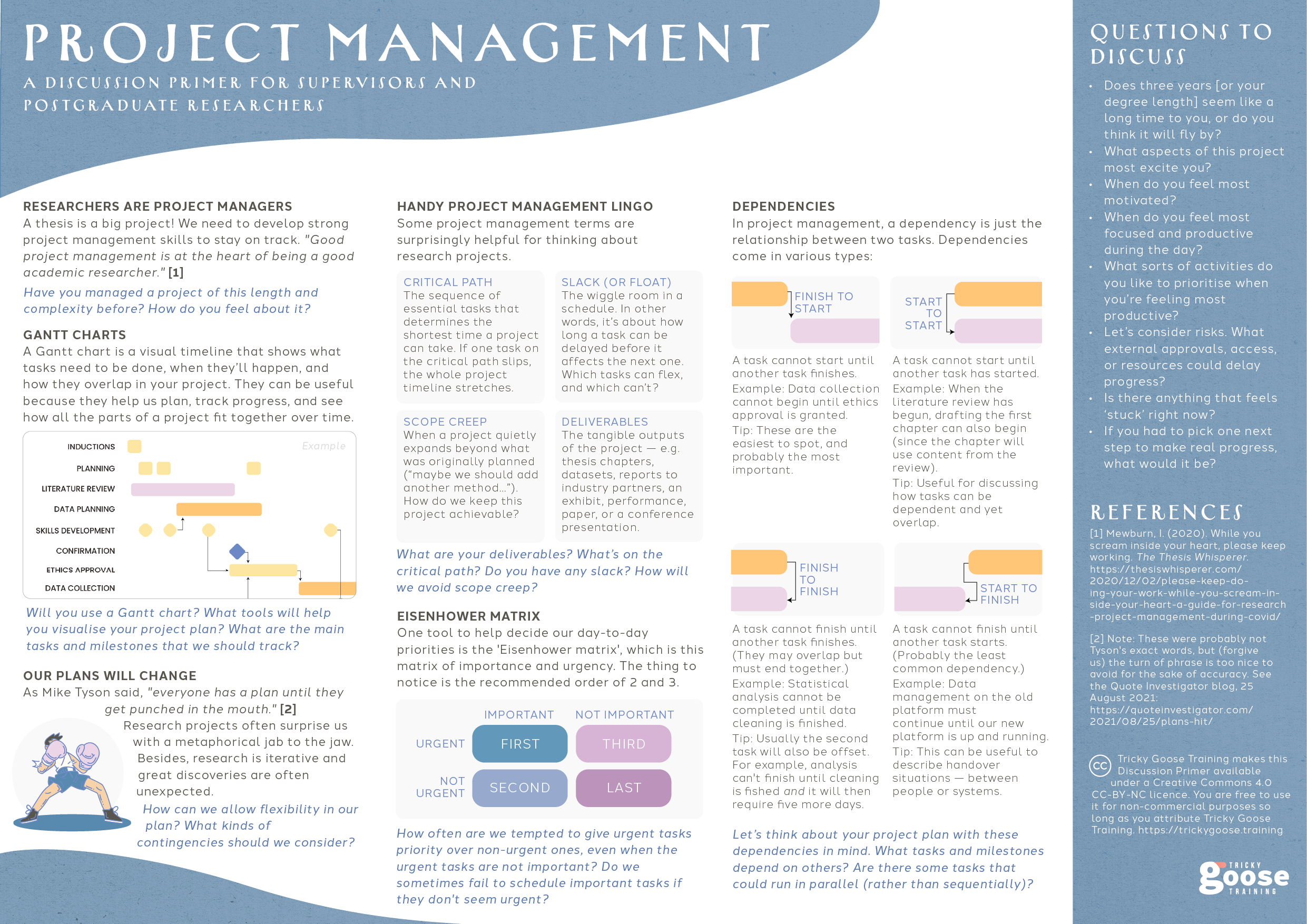Things you can use
This page includes resources you can download and use for free under a Creative Commons Licence. Enjoy!
Project management for supervisors and postgrads
CC-BY-NC
A doctorate is a complex undertaking. Postgraduate researchers need to develop strong project management skills to stay on track.
This discussion primer helps supervisors and candidates have useful conversations about project management. It covers, for example, Gantt charts, some useful lingo, dependencies, and prioritisation.
It’s one of many engaging resources in our latest course Supervising Postgraduate Researchers.
It prints nicely in A3. (That’s 11 × 17 inches for North American folks).
It’s free to use under a Creative Commons licence (CC BY NC).
Basic introduction to research integrity
CC-BY-NC
This one is not technically a download, but it is a freely available webpage, available for re-use under a Creative Commons Licence (attribution, non-commercial).
It would suit anyone who already knows something about academia, but hasn’t yet had an opportunity to reflect critically on the importance of research integrity.
Researcher assessment primer
CC-BY-NC
How should we assess researchers? Their publications? Their teaching? Their real-world impact? Their academic service?
It matters very much – for our culture, for fairness and equity, and because the existing incentive structures of academia undoubtedly fuel shoddy scholarship and scientific fraud.
Discuss this one-page (A3) discussion primer with your colleagues. Debate is fun!
It’s free to use under a Creative Commons licence (CC BY NC).
Paper mills: an introduction
CC-BY-NC-ND
This short video provides a brief introduction to the problem of Paper Mills.
It’s free to use, just like our discussion primer (below), under a Creative Commons CC BY NC ND licence.
Paper mills primer
CC-BY-NC
Our discussion primer about paper mills is free to use under a Creative Commons 4.0 CC-BY-NC license.
This resource helps provoke meaningful discussions between researchers about how to address the paper mill problem. It’s a one-page infographic agenda for an interactive workshop.
What are paper mills? How prevalent are they? How can we spot fraudulent papers? Are we susceptible to paper mills? What can we do?
It prints nicely as an A3 page. You can also use it on your devices, or display it on a meeting room screen.
It’s part of our course, Quality Through Integrity.
Human ethics menu
CC-BY-NC-ND
This activity helps research institutions develop effective training about human research ethics.
It works like this: Imagine that every researcher at your institution must undertake a one-hour training course about human research ethics. You’re in charge of the course. So, you decide how best to use the precious hour. In the boxes of the ‘menu’, write the number of minutes that your course will spend on each item. That may be zero for some items. You value researchers’ time, so your total minutes cannot exceed sixty.
What will you cover? You’ll have to make some difficult trade-offs.
It prints nicely as a colour A3 page. We've made it available under a Creative Commons 4.0 CC-BY-NC-ND licence.
Peer review primer
CC-BY-NC-ND
To celebrate Peer Review Week, we made our Peer Review Discussion Primer available under a Creative Commons 4.0 CC-BY-NC license. You can use it for any non-commercial purpose so long as you attribute Tricky Goose Training.
This primer's purpose is to provoke thoughtful discussions within research teams about peer review. It's one of a series of discussion primers that are supplementary materials for our Quality Through Integrity course.







